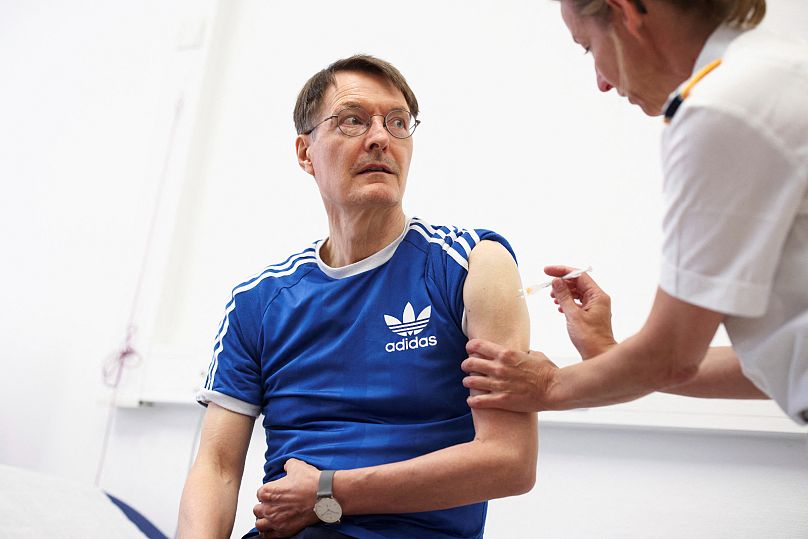COVID-19 cases and hospitalisations are rising in Europe. Here’s a look at some of the plans for vaccination across the continent.
France launched a new vaccination campaign against COVID-19 this week, urging vulnerable individuals to get another booster jab with the vaccines updated to tackle the latest circulating variants.
 ADVERTISEMENT
ADVERTISEMENT
 ADVERTISEMENT
ADVERTISEMENT
It comes as cases are rising in more than half of European countries, according to the European Centre for Disease Prevention and Control (ECDC), with increases in hospitalisations, ICU admissions, and deaths in some countries, though this remains limited.
While some 73 per cent of people in EU and European Economic Area (EEA) countries have had a primary course of COVID-19 vaccination, the original one or two-shot jab regime, booster shot uptake is lower.
Just over half of Europeans have had a first booster, and only 14 per cent have had a second booster, according to data from the ECDC.
Here is a look at some of the vaccination guidelines in EU countries and what to do if you get a positive COVID-19 test in most EU countries.
Who should get vaccinated against COVID?
European countries recommend that vulnerable individuals at risk of developing severe COVID-19 get a booster shot, with some governments bringing up their winter vaccination campaigns amid rising cases towards the end of the summer season.
The start of vaccination campaigns also coincides with the release of updated vaccines that target Omicron subvariants, like XBB 1.5, that have become dominant across the continent.
These updated vaccines have also been found to protect against related variants such as EG.5 and BA.2.86.
France moved up its vaccination campaign against COVID-19 to this week, urging vulnerable individuals to get a booster jab. The shot is free and possible for any person who would like to receive it in the country.
It is recommended for people 65 and older, those with comorbidities or who are immunocompromised, pregnant women, people in care homes and those in contact with vulnerable individuals.
Germany’s Robert Koch Institute now recommends an annual COVID-19 booster vaccination for people with an increased risk of developing severe illness, such as those aged 60 and up, residents of care facilities, and people with comorbidities.
German health minister Karl Lauterbach received a new booster shot last month, in an effort to convince others to do the same.
Spain updated its winter vaccination recommendations in September, urging people over 60, those in care homes, those who are immunocompromised, pregnant women, and people with comorbidities to get vaccinated against COVID-19 and the flu.
The Netherlands has also started re-vaccinating at-risk groups against COVID-19. People who would like to get a vaccine because they live with people who are at risk for more severe forms of the disease may also receive one.
Fifth booster doses were available in Poland from April for people at risk for severe illness as well as for health workers.
Bulgaria began its new campaign with the vaccines that target the Omicron XBB subvariant last week, with the vaccines available to people over the age of 12.
Vaccination is “strongly recommended” for older people, those with chronic diseases, immunocompromised individuals, pregnant women, and health and care home workers, the Bulgarian health ministry said.
One of the concerns about the winter season is the co-circulation of COVID-19 with other respiratory illnesses such as flu and RSV and the possibility that the three viruses overwhelm hospitals.
“In the last winter season, although SARS-CoV-2 circulated at much lower rates than in the previous two years, its impact was heightened by the co-circulation of influenza and RSV, resulting in healthcare services being put under heavy pressure,” said ECDC director Andrea Ammon last month.
“Despite uncertainties as to how the 2023/2024 season will evolve, we need to act now to minimise the expected burden on healthcare systems caused by co-circulation of respiratory viruses,” she said, emphasising the need to vaccinate people at risk of being hospitalised for COVID-19.
Do you still have to isolate yourself if you have COVID?
European countries no longer have mandatory isolation in the case of a positive COVID-19 test as of this year.
The Netherlands’ said it withdrew rules for testing and isolating due to the “high level of immunity in the Dutch population and because few people are becoming severely ill from the variants that are currently circulating”.
Instead, the government recommends people use “common sense” and try to stay home if they have symptoms or work from home if they can.
This was part of a new period where we “learn to live with the virus,” health minister Ernst Kuipers said in March.
Germany recommends staying at home if you are sick but does not require isolation or quarantine for people with COVID-19 as of July of this year. France has a similar recommendation after a positive test.
“The epidemiological situation with COVID-19 currently does not require any ordered infection protection measures for the general population in the sense of isolating sick people and quarantining contact persons,” the German health ministry wrote to Euronews Next.
“If symptoms of a respiratory infection occur, such as a runny nose, sore throat or cough, it is recommended to stay at home and avoid contact for 3 to 5 days until the symptoms have significantly improved. If necessary, a doctor's practice should be contacted”.
Italy lifted its last COVID-19 isolation restrictions in August, stating that the availability of vaccines and drugs no longer made it necessary to require mandatory self-isolation.
Italian health minister Orazio Schillaci said that the ministry would continue to monitor the virus situation and adopt new measures to contain the virus if needed.











